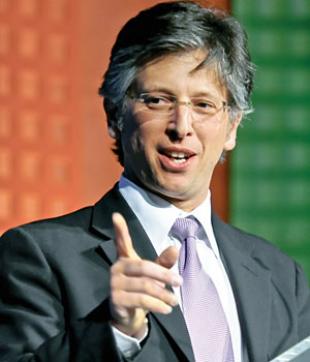Location:
Ashworth Labs, Lecture Theatre 3
Date:
Nanotechnology Approaches to Biological Heterogeneity and Cellular Therapies
Paul S. Weiss, California NanoSystems Institute and Departments of Chemistry & Biochemistry and Materials Science & Engineering, UCLA
The great promise of single-molecule/assembly measurements is to understand how critical variations in structure, conformation, and environment relate to and control function. New approaches to sensing, imaging, and analysis are keys to elucidating these associations. I will discuss current and upcoming advances and will pose the challenges that lie ahead in creating, developing, and applying new tools for biology and medicine. These advances include using biomolecular recognition in sensor arrays to probe dynamic chemistry in the brain and microbiome systems. It also includes fusing spectroscopic imaging modalities and freeing up bandwidth in measurements to record simultaneous data streams and to expand our dynamic range. Recent advances in sparsity and compressive sensing can be applied both to new analysis methods and to directing measurements so as to assemble and to converge structural and functional information. Early examples will be discussed. Further, we introduce biomolecular payloads into cells for gene editing at high throughput for off-the-shelf solutions targeting hemoglobinopathies, immune diseases, and cancers. We circumvent the need for viral transfection and electroporation, both of which have significant disadvantages in safety, throughput, cell viability, and cost. Mechanical deformation can make cell membranes transiently porous and enable gene-editing payloads to enter cells. These methods use specific chemical functionalization and control of surface contact and adhesion in microfluidic channels.
Bio
Paul S. Weiss graduated from MIT with S.B. and S.M. degrees in chemistry in 1980 and from the University of California at Berkeley with a Ph.D. in chemistry in 1986. He is a nanoscientist and holds a UC Presidential Chair and a distinguished professor of chemistry & biochemistry and materials science & engineering at UCLA, where he was previously director of the California NanoSystems Institute. He also currently holds visiting appointments at Harvard’s Wyss Institute and several universities in Australia, China and South Korea. He studies the ultimate limits of miniaturization, developing and applying new tools and methods for atomic-resolution and spectroscopic imaging and patterning of chemical functionality. He and his group apply these advances in other areas including neuroscience, and microbiome studies, and high-throughput stem cell transfection. He led, coauthored, and published the technology roadmaps for the BRAIN Initiative and the U. S. Microbiome Initiative. He has won a number of awards, in science, engineering, teaching, publishing, and communications. He is a fellow of the American Academy of Arts and Sciences, the American Association for the Advancement of Science, the American Chemical Society, the American Institute for Medical and Biological Engineering, the American Physical Society, the American Vacuum Society, the Canadian Academy of Engineering, and an honorary fellow of the Chinese Chemical Society. He is the founding and current editor-in-chief of ACS Nano.



